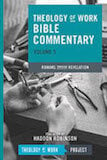Faith and Work(s) (James 2:14–26)
Bible Commentary / Produced by TOW Project_(james_2-14-26).jpg)
James takes up the topic of work in detail in the second part of chapter 2. When discussing work, he invariably uses the plural “works” (Greek erga) rather than the singular “work” (Greek ergon). This leads some to suppose that James uses “works” to mean something different from “work.” However, erga and ergon are simply plural and singular forms of the same word.[1] James is describing any kind of work, from works of kindness, such as giving food to someone who is hungry, to on-the-job work, such as increasing the sustainable yield of rice paddies. His use of the plural shows that he expects Christians’ work to be continual.
Grace and Works Interact in Business (Click to Watch) |
James’s focus on work has led to deep controversy about the letter. Luther famously disliked James because he read James 2:24 (“You see that a person is justified by works and not by faith alone”) to be a contradiction of Galatians 2:16 (“A person is justified not by the works of the law but through faith in Jesus Christ”). Other leaders of the Protestant Reformation did not share this view, but Luther’s objection came to dominate the Protestant reading of James.[2] Although we cannot go into the long debate about Luther and the book of James here, we can inquire briefly whether James’s emphasis on work is at odds with the Protestant rejection of “justification by works.”
What does James himself say? James 2:14 is arguably the centerpiece of his argument, so we will consider this section before moving on: “What good is it, my brothers and sisters, if you say you have faith but do not have works?” James bluntly answers his own question by stating, “So faith by itself, if it has no works, is dead” (James 2:17)—as dead (as he notes in a carefully chosen example) as someone in desperate need of food who receives only empty words of well-wishing from his neighbor (James 2:15–16). James takes it for granted that believing in Christ (trusting in God) will move you to feel compassion for— and act to help—someone in need.
We have opportunities every day to meet the needs of people we work for and among. It can be as simple as making sure a confused customer finds the right item for their need or noticing that a new co-worker needs help but is afraid to ask. James urges us to take special concern for those who are vulnerable or marginalized, and we may need to practice noticing who these people are at our places of work.
This is the heart of the book of James. James does not imagine that work is at odds with faith. There can be no “justification by works” because there can be no good works unless there is already faith (trust) in God. James doesn’t mean that faith can exist without works yet be insufficient for salvation. He means that any “faith” that doesn’t lead to works is dead; in other words, it is no faith at all. “As the body without the spirit is dead, so faith without works is also dead” (James 2:26). James doesn’t command Christians to work for the benefit of others in need instead of placing faith in Christ, or even in addition to placing faith in Christ. He expects that Christians will work for the benefit of others in need as a result of placing faith in Christ.[3]
The insight that Christian faith always leads to practical action is in itself a lesson for the workplace. We cannot divide the world into spiritual and practical, for the spiritual is the practical. “You see that [Abraham’s] faith was active along with his works,” James says (James 2:22). Therefore we can never say, “I believe in Jesus and I go to church, but I keep my personal faith out of my work.” That kind of faith is dead. James’s words “You see that a person is justified by works and not by faith alone” (James 2:24) challenge us to work out our commitment to Christ in our daily activities.
The rest of the letter gives practical applications of the two underlying principles of trust in God and working to benefit others in need. Given our assessment of James 2:14–26, we will proceed with the perspective that these applications are outworkings of faith in Christ, valid in James’s day and instructive in ours.












